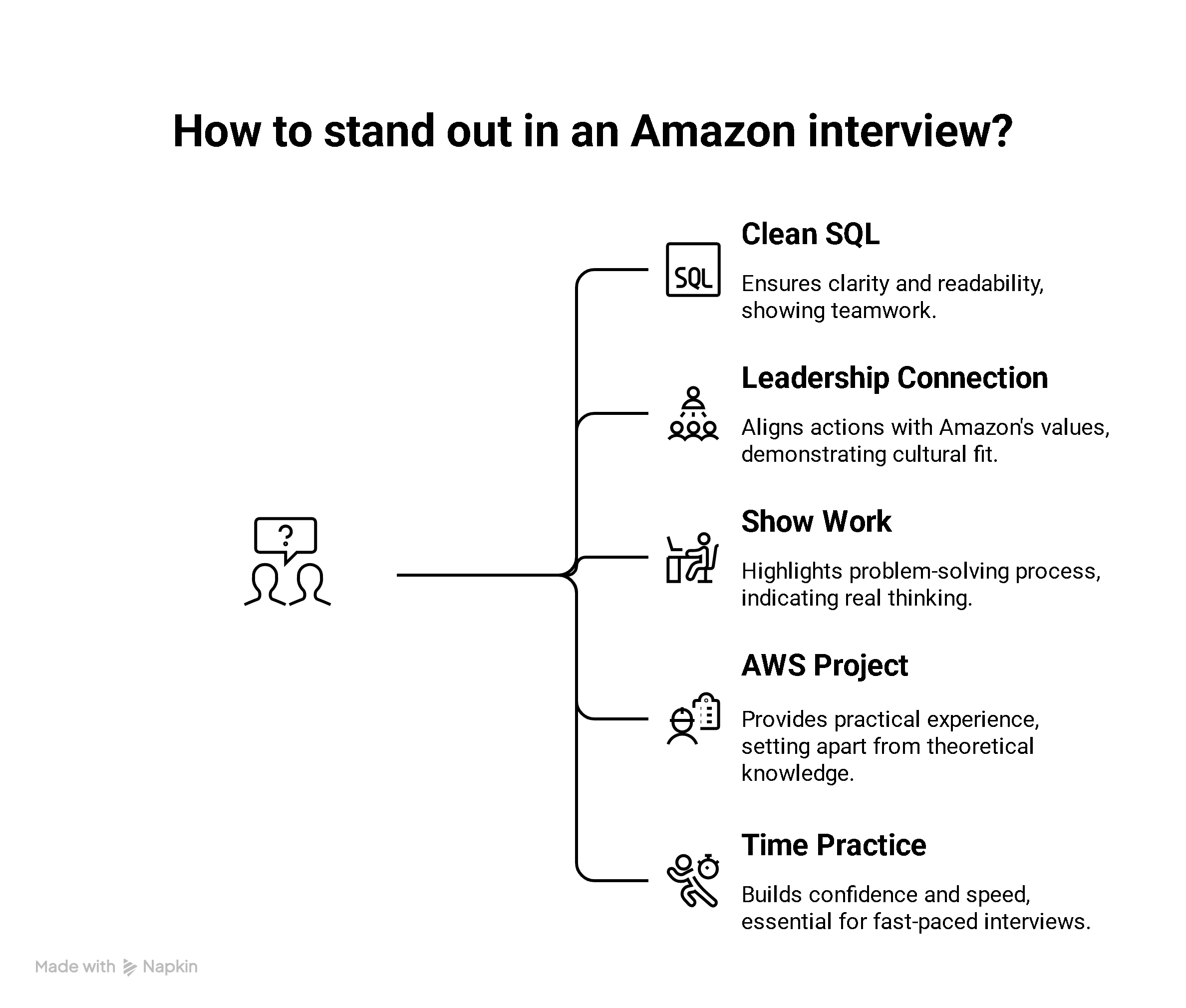Landing a data engineering job at Amazon isn’t just about knowing SQL or writing Python scripts. It’s about showing you can solve complex problems with clear thinking, protect data under pressure, and build systems that scale with growth. Amazon doesn’t want someone who memorizes concepts—they want builders who understand why things work the way they do.
This guide gives you the core things you need to be confident in the interview. You’ll learn what skills matter most, how the interview is structured, and what Amazon really looks for in a data engineer. If you’re wondering where to focus your time or how to stand out in a room full of smart people, you’re in the right place.
Let’s break it down step-by-step so you walk into your interview ready—not stressed.
What Amazon Looks for in a Data Engineer
Amazon expects data engineers to be strong problem-solvers with practical skills. They want people who can write clean SQL, build scalable data pipelines, and think fast when something breaks in production. If you’re applying, focus on these core areas:
- SQL and Python Skills: Write readable code, handle large datasets, and solve real business problems.
- Data Models and ETL: Design organized databases, automate data flow, and fix errors without stopping everything.
- Big Data Tools: Be comfortable using tools like Spark or Hadoop. Amazon often handles data in terabytes or more.
- AWS Experience: Know services like Redshift, Glue, or S3. Even basic knowledge shows you’re comfortable with cloud tools.
- Leadership Principles: Your attitude matters as much as your skill. Amazon looks for ownership, curiosity, and a customer-first mindset.
Keep your examples real. If you improved a pipeline or solved a tough bug, share the result clearly. You’re not proving you’re perfect—you’re showing you learn fast, fix problems, and stay calm under pressure.
Amazon’s Interview Process (Step-by-Step)
Understanding Amazon’s hiring process lets you walk in with confidence instead of guessing what’s next. The steps are predictable—but they go deep. Here’s how it works and what you should expect at each stage:
1. Recruiter Screen
The first step is a short call with a recruiter. This isn’t a technical test—it’s to confirm you understand the role and have the core skills Amazon needs. The recruiter will ask about your background, experience with data tools, and your interest in Amazon. Be honest and clear. If your resume matches what they’re looking for, you’ll move forward.
2. Online Assessment (SQL, Logic, Python)
Next, you’ll complete an online test. It usually includes SQL queries, logic questions, and basic Python coding. Think of it as a way for Amazon to quickly see how you reason through problems. It’s timed, but not tricky. If you’ve worked with data in real projects, you’ll recognize most patterns. Focus on clean answers, not fancy ones.
3. Technical Phone Interview
This is your first live technical round. You’ll write SQL and Python on a shared doc and answer data modeling or pipeline questions. Expect something like: “How would you clean this dataset?” or “Write a query to find the top 3 selling products.” Speak your thought process out loud—show you’re organized, calm, and logical. They want to hear how you think, not just what you type.
4. Onsite / Loop Interview
The final stage is a series of back-to-back interviews, done virtually or at an Amazon office. You’ll face both technical and behavioral questions. One round may cover ETL pipelines; another may be all about how you handled mistakes in the past. Every answer should show skill and ownership. Connect your stories to Amazon’s Leadership Principles.
5. Final Review and Offer
After the loop, all interviewers discuss your performance. Amazon looks for consistency: Were you strong in both coding and thinking? Did you show leadership even while talking about data? If the panel agrees you’re a good fit, you’ll get an offer. If not, your recruiter may suggest other roles better aligned with your strengths.
Key Technical Topics to Prepare
Amazon expects data engineers to be strong in both theory and hands-on work. You don’t have to know everything—but you should be comfortable with the basics in each of these areas. Here’s what to focus on:
1. SQL
SQL is the most tested skill in the interview. You’ll be asked to write queries involving joins, window functions, grouping, and ranking. Questions often mimic real business problems:
- “Find the top 3 customers based on purchase amount.”
- “Show orders that repeat within 30 days.”
Keep your queries readable. Use clean formatting, meaningful column names, and avoid overcomplicating your logic.
2. Data Modeling & ETL
Data modeling questions test if you can design structures that scale. Expect topics like star schema, indexes, or slowly changing dimensions. ETL questions usually focus on how to move and clean data without breaking downstream processes. Be ready to explain:
- How you’d load data from multiple sources
- How you’d fix broken records in a pipeline
- When you’d use batch vs. streaming
3. Python for Data Engineering
You don’t need to write full apps, but you should write clean functions that parse, transform, or validate data. Common tasks include:
- Removing duplicates
- Processing JSON
- Reading large files without crashing your system
Write code that other people can read and reuse.
4. Big Data Tools
You don’t need months of Hadoop experience, but you should understand the basics of distributed processing. Tools like Spark and Hive come up often. Know what a partition is, why parallelism matters, and how data size affects performance.
5. AWS Data Services
Since Amazon uses its own cloud, you’ll score extra points if you understand key services like Redshift, S3, Athena, or Glue. Be ready to say what each tool is used for—even if you’ve only tried them in personal projects.
Behavioral Interview: Leadership Principles
At Amazon, your mindset matters as much as your coding skills. Every interviewer is trained to evaluate how you think, how you act under pressure, and how you learn from mistakes. They do this through Amazon’s 16 Leadership Principles — the core values driving decisions across every team.
Why Behavior Matters
You’re not just judged on the code you write, but on how you solve the problem. Amazon wants people who take ownership, act fast, and care about the people their work affects. This is why clear and honest answers matter—your stories show who you really are behind the skills.
How to Answer the Right Way
Use the STAR format:
- Situation – What was going on?
- Task – What were you trying to do?
- Action – What did you do?
- Result – What happened?
Stick to one story per answer. Don’t talk in circles. Give specific details, quantify impact when possible, and show what you’d improve next time.
Sample Leadership-Based Questions
- “Tell me about a time when you solved a problem no one else could.”
- “Describe a situation where you made a mistake in production. What did you do?”
- “How did you handle a conflict with a teammate?”
They’re not looking for perfection—they’re looking for honesty, ownership, and growth.
Tips to Stand Out
A little structure goes a long way. Before you dive into prep, use these quick tips to focus your time and show your best work.

1. Keep Your SQL Clean and Clear
Amazon values clarity over cleverness. Write readable SQL with proper spacing and names that make sense. If your answer is easy to understand, it shows you’re a team player who thinks beyond the keyboard.
2. Connect Every Example to a Leadership Principle
Technical skills get you in the door, but showing ownership or customer focus gets you the offer. When answering questions, link your actions to Amazon’s values. It proves you’re aligned with their culture—not just their tech.
3. Show Your Work, Even When You’re Unsure
If you’re stuck, talk through your thinking. Amazon cares about how you solve problems, not just the final answer. Let them see your logic. It shows real thinking—exactly what they want on their teams.
4. Build a Mini-Project with AWS Beforehand
Even simple projects go a long way. Upload a file to S3, query it with Athena, or build a small pipeline. Mentioning real AWS experience in your answers puts you ahead of others who’ve only “read about” cloud tools.
5. Practice Under Time Pressure
Interviews move fast. Time yourself writing SQL, Python, or designing a small pipeline. The faster you think with clarity, the more confident you appear—and confidence is contagious in interviews.
Conclusion
Preparing for an Amazon data engineer interview is less about memorizing every tool and more about thinking like an engineer who builds for scale, stays calm under pressure, and works with clarity. Amazon looks for people who combine practical skills with clear communication and real ownership.
Focus on what truly matters: writing clean SQL, understanding data flows, using Python wisely, and grounding your answers in leadership values. You don’t need to master every AWS service or write perfect code on the first try—what matters is how you think, learn, and adapt.
Stay calm, keep your answers honest, and practice with purpose. If you can show you’re both a problem solver and a team player, you’ve already done most of the work. The rest is just walking in prepared—and letting your experience speak for itself.




